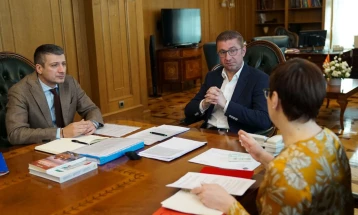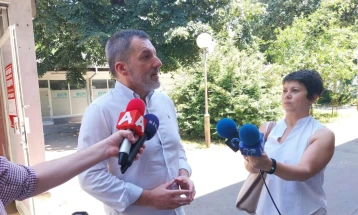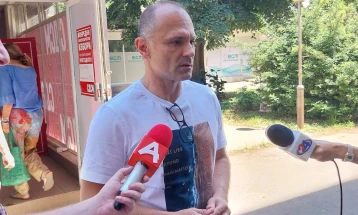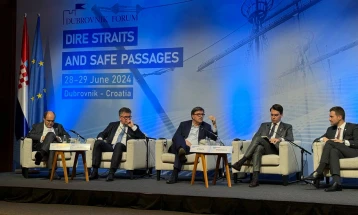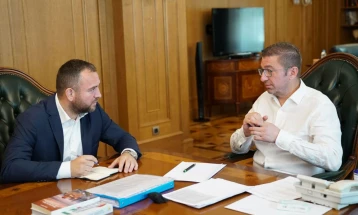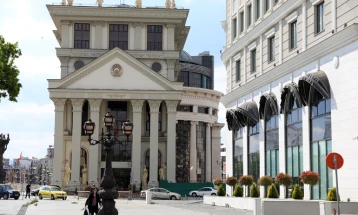Construction of Bulgaria railway to resume in September after 2-year hiatus
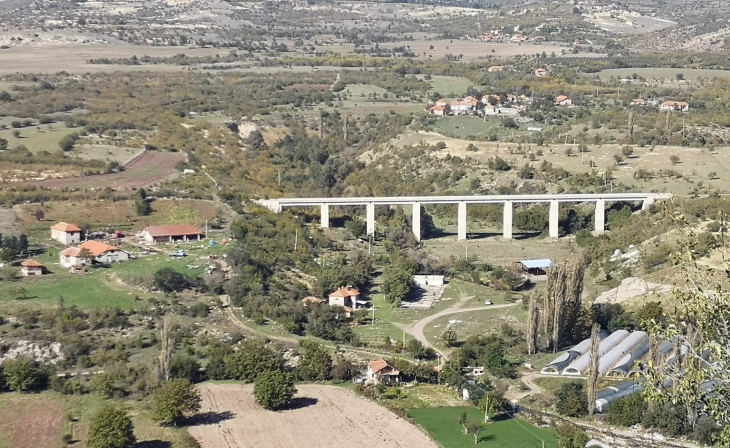
Skopje, 5 August 2022 (MIA) – The new contractors on the railway to Bulgaria will be granted access to the construction sites in August, construction is expected to begin in September, after all administrative procedures are complete.
“Strabag” will work on the reconstruction and completion of the first section, Kumanovo – Beljakovce, where there hasn’t been any construction work since June 2020, while “Gülermak” will build the second section, Beljakovce – Kriva Palanka. They will provide the management and engineering staff, while the operational staff and the construction machinery will be from the country.
Hari Lokvenec, head of the PE ZRSM Infrastructure, the state company investor, promised absolute transparency during the process, considering the past of the decades-long project, which had multiple delays, and which all governments worked on and promised to complete.
“Considering that ‘Strabag’ is an already established company in the country and has all necessary conditions to begin work, they will start much sooner than the Turkish company. The contractors will be granted access to the construction sites this month, and the beginning of construction will be decided in coordination with them. Keeping in mind that there is a lot of construction to be done on the second section of the railway, the expectations are that construction on this section will begin towards the end of September,” Lokvenec told MIA.
The beginning of constructions, he said, will be preceded by opening a subsidiary in the country, receiving a certificate from the Chamber of Certified Architects and Engineers, as well as receiving approval from the Ministry of Transport and Communications based on the approvals received by the engineers as an integral part of the team in charge of the project’s implementation.
“As investors we have the obligation to grant them access to the construction site in the upcoming period and to prepare a day for the beginning of constructions. The date on which construction should begin, in accordance with the European Bank for Reconstruction and Development regulations, is eight to 90 days after the contract is signed, and these deadlines, will be surely respected, but we are trying to minimize them and to begin construction as soon as possible,” said Lokvenec.
The deadline for the realization of the first phase of the Kumanovo – Beljakovce railway is 24 months, and there is work along the entire 31-kilometer route. According to the estimates from the previous supervising engineer, 54 percent of the works there have been completed, and the investment amounts to 40.5 million euro. For the second section, Beljakovce – Kriva Palanka, with a length of 34 kilometers and a value of 155 million euro, the construction deadline is 36 months.
“It has been pledged that the construction deadlines will be cut by six months, but we would be satisfied with the completion of construction within the deadline. As investors we will offer them complete logistical support to ensure the smooth running of the process,” said Lokvenec.
He is confident that construction will finish within the deadlines, and he backs this up with the provided funds, and, he said, the fact that there are no major archaeological finds along the route that would slow down the project, the 100 percent completed expropriation, as well as the quality of the contractors.
According to Lokvenec, the contractors will bring their management and engineer staff, while domestic staff will work on the operational part, and domestic construction machinery will be used. He expects all possible machinery to be included in these projects considering their size and the need to complete them on time.
For the third section, from Kriva Palanka to the border with Bulgaria, a tender for the selection of a contractor should be announced by the end of 2022. Currently the project documentation is being evaluated by an EU consultant, and this evaluation will serve as the basis on which the conditions of the tender will be set to ensure the effective realization of the project. 216 million euros have already been secured from the necessary 405 million euro, according to the project value estimated five years ago. The current finances for the project were secured through investment grants from the Western Balkans Investment Fund (WBIF) amounting to 155 million euro, as well as 61 million euro from the IPA II programme. Construction is expected to begin in 2023, and be completed in 2027, which is the promised deadline for the completion of activities on the Bulgarian side.
On the first section, railway stations are planned in Novo Kumanovo, Suplji Kamen and Beljakovce, as well as six stops, the second one will have stations in Kriva Palanka and Ginovce and three stops, while on the third section, 25 tunnels and 51 bridges are planned along 24 kilometers.
The project for the railway to Bulgaria began in 1994, and construction was halted for the first time in 2004. Construction resumed a decade later, in March 2014, but the 2016 completion deadline was not met, due to, according to official explanations, problems of legal nature related to property ownership. There have been no ground activities since June 2020, when the German contractor “Wiebe” unilaterally terminated the contract.
In January 2022, the European Bank for Reconstruction and Development (EBRD) announced a tender for the selection of contractors to work on the railway, and the procedure was completed in July 2022 when contracts were signed with “Strabag” and “Gülermak”. Included in the tender is also the contract for reconstruction of the Nogaevci – Negotino railway as part of Corridor 10, with a length of 31 kilometers, “Strabag” was selected as contractor for this 4.8-million-euro investment. The total finances behind the three contracts amount to more than 200 million euro. ad/ba/
